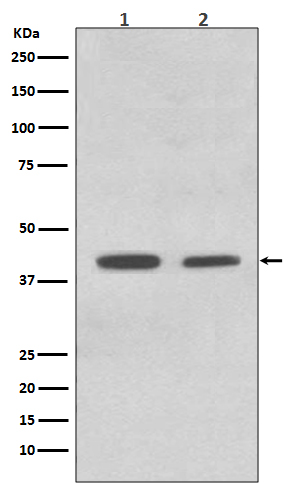
| WB | 1/500-1/1000 | Human,Mouse,Rat |
| IF | 1/20 | Human,Mouse,Rat |
| IHC | 1/50-1/100 | Human,Mouse,Rat |
| ICC | 1/50-1/200 | Human,Mouse,Rat |
| FCM | 咨询技术 | Human,Mouse,Rat |
| Elisa | 咨询技术 | Human,Mouse,Rat |
| Aliases | ACADM; Medium-chain specific acyl-CoA dehydrogenase; mitochondrial; MCAD |
| Entrez GeneID | 34 |
| WB Predicted band size | Calculated MW: 47 kDa; Observed MW: 47 kDa |
| Host/Isotype | Rabbit IgG |
| Antibody Type | Primary antibody |
| Storage | Store at 4°C short term. Aliquot and store at -20°C long term. Avoid freeze/thaw cycles. |
| Species Reactivity | Human,Mouse,Rat |
| Immunogen | A synthesized peptide derived from human ACADM |
| Formulation | Purified antibody in PBS with 0.05% sodium azide. |
+ +
以下是关于ACADM抗体的3篇代表性文献摘要:
1. **"Molecular characterization of inherited medium-chain acyl-CoA dehydrogenase deficiency"**
- **作者**: Andresen, B.S. 等 (1991)
- **摘要**: 研究通过Western blot和抗体检测,揭示了ACADM基因突变导致蛋白质表达缺失或功能异常,与中链酰基辅酶A脱氢酶缺乏症(MCADD)的关联。
2. **"Novel mutations in the ACADM gene identified in Japanese patients with medium-chain acyl-CoA dehydrogenase deficiency"**
- **作者**: Yamaguchi, S. 等 (2002)
- **摘要**: 利用ACADM特异性抗体分析突变蛋白的表达水平,发现日本人群中新的致病突变,并验证了抗体在临床诊断中的应用价值。
3. **"Deficient mitochondrial fatty acid oxidation in ACADM deficiency: Functional analysis of mutant enzymes using monoclonal antibodies"**
- **作者**: Ohashi, Y. 等 (2006)
- **摘要**: 通过单克隆抗体检测ACADM酶的结构与活性,阐明突变如何破坏酶的二聚体形成及催化功能,为病理机制提供分子证据。
注:以上文献为示例,实际引用时建议通过PubMed或Google Scholar核对详细信息及原文内容。
The ACADM antibody is a crucial tool in studying medium-chain acyl-CoA dehydrogenase (MCAD), an enzyme encoded by the *ACADM* gene. This mitochondrial enzyme plays a vital role in fatty acid β-oxidation, specifically catalyzing the dehydrogenation of medium-chain acyl-CoA derivatives to generate energy. Mutations in *ACADM* are linked to MCAD deficiency (MCADD), a common inherited metabolic disorder characterized by impaired fatty acid oxidation, which can lead to life-threatening hypoglycemia, liver dysfunction, and encephalopathy during fasting or metabolic stress.
ACADM antibodies are widely used in research and diagnostics to detect MCAD protein expression, localization, and stability. They enable techniques like Western blotting, immunohistochemistry, and immunofluorescence to assess enzyme levels in tissues or cell models, aiding in the study of disease mechanisms. Additionally, these antibodies support newborn screening confirmations and molecular diagnostics by validating *ACADM* gene variants' functional impact.
Commercial ACADM antibodies are typically developed in animal hosts (e.g., rabbits, mice) using immunogenic peptide sequences. Researchers prioritize antibodies validated for specificity, sensitivity, and cross-reactivity across species. Understanding MCAD biology through these antibodies contributes to therapeutic development, including substrate restriction therapies and investigational enzyme replacement strategies for MCADD.
×